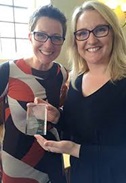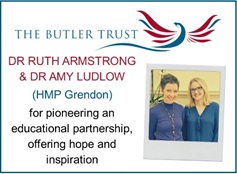Learning Together: what happens when students from universities and prisons learn together?
Main contacts: Amy Ludlow and Ruth Armstrong
 In January 2015, Drs Amy Ludlow and Ruth Armstrong were successful in obtaining support from The University of Cambridge’s Teaching and Learning Innovation Fund to pilot a new educational initiative called Learning Together. Since then, Learning Together has attracted funding from the British Academy, ESRC and HEFCE and has become a national initiative with growing international connections. Learning Together was highlighted as an example of best practice by Dame Sally Coates in her 2016 review of prison education. Amy and Ruth have since received a Butler Trust Award and awards from the Prisoner Learning Alliance and the University of Cambridge for public engagement with research for their work on Learning Together.
In January 2015, Drs Amy Ludlow and Ruth Armstrong were successful in obtaining support from The University of Cambridge’s Teaching and Learning Innovation Fund to pilot a new educational initiative called Learning Together. Since then, Learning Together has attracted funding from the British Academy, ESRC and HEFCE and has become a national initiative with growing international connections. Learning Together was highlighted as an example of best practice by Dame Sally Coates in her 2016 review of prison education. Amy and Ruth have since received a Butler Trust Award and awards from the Prisoner Learning Alliance and the University of Cambridge for public engagement with research for their work on Learning Together.
 Learning Together brings together people in criminal justice and higher education institutions to study alongside each other in inclusive and transformative learning communities. Learning Together partnerships provide higher education opportunities for people to study together, and learn with and from each other through dialogue and the sharing of experience. Learning Together courses are academically rigorous and their design and delivery builds upon and, through evaluation, advances educational, sociological and criminological research and best practice.
Learning Together brings together people in criminal justice and higher education institutions to study alongside each other in inclusive and transformative learning communities. Learning Together partnerships provide higher education opportunities for people to study together, and learn with and from each other through dialogue and the sharing of experience. Learning Together courses are academically rigorous and their design and delivery builds upon and, through evaluation, advances educational, sociological and criminological research and best practice.
Since its inception, Learning Together has been evaluated with the aim of understanding participants’ experiences in order to feed those experiences forward into our practices and enrich the theoretical foundations on which Learning Together is designed and delivered. Our approach to evaluation is highly inductive and our methods have been co-produced with our students who are participating in the research. We are gathering data in four key ways:
(1) asking all of our students who wish to participate in the research to complete questionnaires before and after the course that ask them to reflect upon their personal attributes and sense of self-efficacy;
(2) asking all of our students, mentors, facilitators and lecturers who wish to participate in the research to share a story each week during the course about their experiences of learning and to answer questions about their story;
(3) asking all of our students, mentors, facilitators and lecturers who wish to participate in the research to partake in a reflective interview at the end of the course; and
(4) asking all of our students, mentors, facilitators and lecturers who wish to participate in the research to come together as a group to make sense of their experiences as a whole in light of the stories that they have shared.
We are actively exploring opportunities to incorporate technology in both the delivery and evaluation of Learning Together.
Carry on reading about Learning Together.
